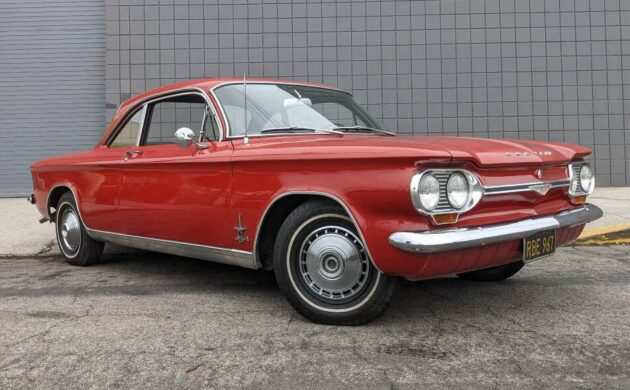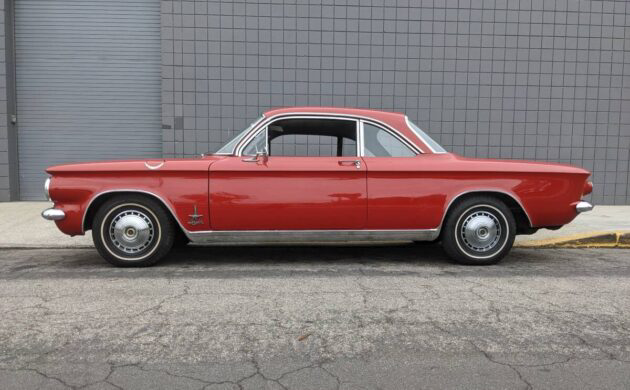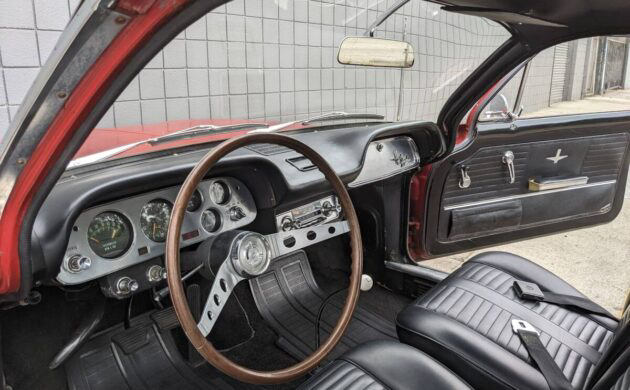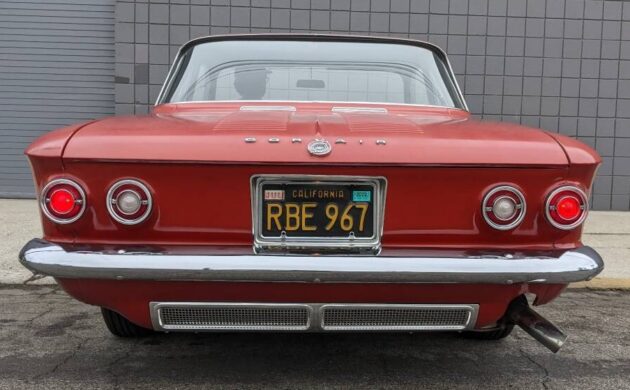Turbo Terrific: 1964 Chevrolet Corvair Monza Spyder
The Corvair represented adventurous engineering by Chevrolet because it had rarely commenced engineering a new model from a blank sheet of paper. It suffered some reputational issues, but a well-maintained example can offer a rewarding driving experience. Our feature car is a 1964 Corvair Monza Spyder, a black plate survivor. It features the range-topping turbocharged motor and is rust-free. If you find yourself irresistibly drawn, it is listed here on Craigslist in Glendale, California. You could drive it home by handing the owner $16,000. I must say a big thank you to Barn Finder T.J. for spotting another fantastic classic.
The seller is this Corvair’s third owner, and they believe the 31,000 miles on the clock might be genuine. They have no documentary evidence, but its general mechanical condition makes it conceivable. The Ember Red paint carries a few scars but remains presentable if the buyer plans to retain it as an original survivor. The panels are pretty straight, and thanks to a life in California, rust is confined to nothing but a few spots of surface corrosion. The chrome sparkles nicely, and there are no glass issues. It is refreshing to find a Corvair of this type rolling on its original wheels because owners in years past would often fit aftermarket wider alloys. They wear their original hubcaps that have avoided the common problem of curb strike.
Turning our attention to the interior, it ticks the right boxes. The original owner ordered it trimmed in Black vinyl, which was the perfect choice to contrast the Red exterior. It is hard to find fault, with the seller indicating they reupholstered it in 2015. However, the carpet is original. The dash is spotless, with the gauge cluster featuring a factory tachometer. There are no aftermarket additions, and the factory radio occupies its rightful spot in the dash.
Chevrolet offered buyers in 1964 a reasonable choice of engines. The pick of the bunch was the range-topping 164ci turbocharged air-cooled six we find powering this classic. It provided 150hp, fed to the back wheels via a four-speed manual transaxle. That power output doesn’t sound like a recipe for fun, but thanks to a curb weight of 2,557lbs, this Corvair could romp through the ¼ mile in 16.5 seconds. Over the past eight years, the seller completed many maintenance tasks to ensure this classic is mechanically sound. These included replacing the harmonic balancer and front brakes, a new clutch, new plugs, a carburetor rebuild, and a new electric fuel pump. The car runs and drives well, and they offer this YouTube video of the car in action as supporting evidence. This Spyder produces no odd noises and gets up and going once the turbo is on boost. It is a car where the new owner could fly in and build a relationship as they drive it home.
Following the negative publicity generated by Ralph Nader’s book, Unsafe at Any Speed, the Corvair suffered a massive drop in popularity and sales. Chevrolet considered pulling the pin on production but didn’t want to be seen running scared. After decades in the wilderness, these classics now enjoy a strong following. This one isn’t perfect, but it’s an excellent survivor ready to provide a new owner with enjoyment. Recent sales results suggest the price is competitive, and although it has only been on the market for just over a day, I think someone will snap it up pretty quickly.
Auctions Ending Soon
 2006 Ford Mustang Saleen S281 SCBid Now11 hours$15,000
2006 Ford Mustang Saleen S281 SCBid Now11 hours$15,000
 2002 Subaru Impreza WRXBid Now3 days$333
2002 Subaru Impreza WRXBid Now3 days$333
 1975 Chevrolet Corvette ConvertibleBid Now3 days$3,000
1975 Chevrolet Corvette ConvertibleBid Now3 days$3,000
 1964 Ford F-100 Camper CustomBid Now3 days$2,000
1964 Ford F-100 Camper CustomBid Now3 days$2,000
 2006 Jeep Wrangler SportBid Now5 days$10,500
2006 Jeep Wrangler SportBid Now5 days$10,500






Comments
A rare car in great condition for a reasonable price. What’s not to like.
Well at least it’s not another convertible, seems like so many that get saved are the drop tops for some reason. I don’t hate convertibles but the drop tops keep showing up and they weren’t the larger numbers sold or produced. Seems many of the early turbo cars are drop tops. Refreshing to see this car looks well kept and someone should enjoy the drive home. 64 has the added rear spring and do handle a bit better although never could get my 62 Monza in real trouble and I was a dumb 17 year old then.
Same deal with their spiritual successor – the 1980s and 1990s Cavalier Z24s. You still see the convertibles time to time but almost never see the hardtops. I was just thinking about that recently in fact.
I think that has to do with how they were used. Hardtops were much more likely to be purchased as budget daily sporty cars by young drivers. So many were ridden hard and put away wet. If the 1st owner didn’t do it then the 2nd or 3rd owner took care of it.
Convertibles were more likely to be purchased as second “fun” cars by older people. That means fewer miles, winter storage in salt states, less aggressive driving, and fewer bad mods. And second cars do not turn over at the same pace that daily driver do over the years, so they were kept longer by owners who cared.
I’m not saying that is true of all of them. I’m sure we could find hardtops in the second category and convertibles that were beaten to death in the first category. But statistically, I think convertibles were far more likely to fall under that second category. So that’s why you see more of them today.
I agree with Bob. What’s not to like about what appears to be a original survivor. Paint is tired on the flat surfaces but the picture of the underside tells the story of a rust free classic with a dry engine. Someone has loved this car and kept it in good condition all these years. The black carburetor means it’s been rebuilt by one of the reputable rebuilders in the Corvair community. I question the miles but it really doesn’t matter. 16K is a vairy fair number for this one. Keep it nice and you will not loose on this one.
I thought the styling on this was just so-so, nothing great. But the first time I drove on, I hated it. I always felt the front wheels were too “flighty”. I drove it for a few miles, then pulled over, and my friend drove it back to the dealership.
I waited a year, then purchased a 65 Impala SS… I loved that car.
Sounds like somebody didn’t u derstand the fact that the front tire pressure should be 16lbs, while the back is 28lbs. A lot of people, dealers, service stations didn’t get the memo. There is no weight up front, so tire pressure was important. If you pumped up all the tires the same, you got just what you described, a flighty front end.
Since I took it back to the “dealership”, I didn’t own the car, I was taking it for a test drive. I have no clue about the air in the tires, I would expect the dealership would have done their duty.
I had a 64 Spyder. Spare tire nested beside turbo. Car would not start in cold weather…Always carried spare cans of starting fluid and my parents’ phone number handy for the many “rescue” trips 55 years ago. A total potential death trap with no frontal protection…Ralph Nader was right on this one in his 1960s book entitled: “Unsafe at any Speed”
which was an understatement…
first-hand, real-life experience for me.
Actually a study done in the early 70’s by the NHTSA completely contradicted Naders claims and found the Corvair no more dangerous than other cars of the day. I’ve been driving them for 40+ years, never found them unsafe.
VW sold millions of cars with swing arm suspensions. You want frontal protection don’t drive a bunch of sixty and seventy built automobiles. Crumple zones were not in the design, collapsible steering column nope. Sorry just the way it is.
In actuality, the front end of the Corvair was pretty effective in sacrificing itself by cryumpling in a front collision. I viewed one which had been run into a telephone pole at 50mph. The body folded around the pole, dissipating the energy. The passenger compartment was fully intact. I wouldn’t have wanted to be wearing only a lap belt…. But the steering wheel in the car wasn’t distorted more than a little bit.
When I was born (in Glendale ironically), my parents drove me home from the hospital in a beautiful white 4 speed Turbo Monza Spyder just like this one. Their other car was a VW bus, so by comparison the Corvair was a riot to drive. I’m sad to say that it was ultimately sold for something more sensible for a growing family. I remeber how much fun it was riding around in the Monza. How I would loved to have learned to drive in that vehicle!
I had a ’63 Monza (non-turbo) and a ’65 Corsa 4-carb during my “growing-up” years. I found them to be a blast to drive, especially the Corsa. As others have stated, with proper maintenance they were as reliable as anything else of the era, handled infinitely better, and were fun to drive and own. Wish I still had one of them!
John Pyzik, Yes they were light weight in the front. But very strong! I happened to be sitting on my front porch one evening as I watched my buddy come down the street towards me at approx. 25 MPH. When all of a sudden a 1967 Catalina crossed in front of him and hit him head on! (the driver leaned over to change the tape in his under dash add-on player) Both cars were in good condition. (no rust buckets) and the Poncho was totaled and had to towed away. (Bent frame besides the normal radiator, A/C condenser, fan, alternator, and ALL front end sheet metal bent) The front panel on the 1964 Corvair was bent as was the hood, bumper and minor tweaks on the front fenders. We jumped up and down on the hood to bend it back down and my buddy drove it home. (the fenders did not even get pushed back against the doors, which is more than could be said for the Poncho) He went to the junk yard and grabbed the sheet metal he needed and had it back in pretty good condition in a week or so. The other guys insurance called the Corvair a total and wrote him a check. He had the car painted, installed new tires and shocks and drove the car for many more years. (the front end strength of Corvairs (to me) is very much like 740/760 series Volvos) I will take either of those cars in a front end collision any day of the week, (IF I HAVE TOBE IN A CRASH!)